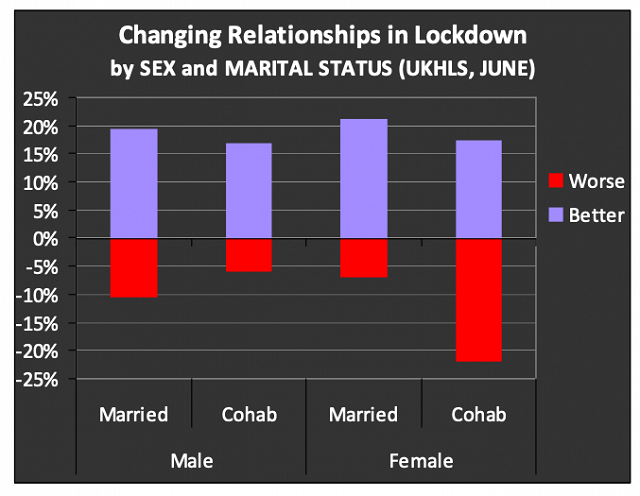Highlights
- In the UK, 20% of married parents said their relationship had improved, vs. 9% who said their relationship was worse. The remaining 71% said their relationships had remained the same. Post This
- For most marriages where commitment is explicit, lockdown has given them time together in a relationship where they actually want to be together. Post This
According to media reports, marriages are cracking under the strain of lockdown and divorce rates are soaring. In August, Mailonline reported a divorce boom in the United States. In September BBC news reported a divorce boom in the UK. Read between the lines, though, and you should start to smell a rat.
Mailonline’s U.S. claim was based on a survey completed by 700 members of a dating agency, hardly a representative sample of couples as a whole. And the BBC’s UK claim was based entirely on a rise in the number of page views on the Citizens Advice website for "getting a divorce" that only happened during August.
In contrast, good news stories are greeted with disbelief. A UK analysis of national survey data found a quarter of parents were getting on better with their children in May compared to just 4% who said they’d got on worse. The Observer dismissed the findings as "Weird but true."
Our new Marriage Foundation analysis reveals what has been actually happening to marriages. With my colleague Steve McKay at the University of Lincoln, we looked at a large national survey conducted in June of 2,559 parents who were either married or cohabiting as a couple.
Our findings, which were covered by The Sunday Times, blow hysterical claims of a coming "divorce boom" out of the water. Here is what we found:
First, 20% of married parents said their relationship had improved, compared to 9% who said their relationship was worse. The remaining 71% said their relationships had remained the same. So the reality is that lockdown was good news for twice as many marriages as it was bad news.

Source: Marriage Foundation, "Has the Lockdown Strengthened Marriages?" November 2020.
Even so, 9% still seems quite a lot. Does that mean a lot of marriages were struggling badly?
Our second finding confirmed that the proportion of couples who were under a lot of stress has indeed risen. Compared to results from the same questions asked during 2017-19, before lockdown, we found more couples who were either very unhappy with their relationship or getting on each other’s nerves a lot or arguing a lot. However, to put this into perspective, we’re talking about an increase of fewer than 2% of parents—mostly married fathers rather than mothers—who were struggling in these lowest relationship categories compared to normal.
We also found that the proportion of couples actively considering divorce had dropped by two-thirds. That’s 70% fewer married fathers and 61% fewer married mothers actively considering divorce. This should really debunk the notion that a divorce boom is on it’s way. It’s not.
By coincidence, a recent IFS report found that four of five U.S. states that report divorce in real time showed a fall in the number of actual divorces. Their further analysis found that half of married couples’ said their appreciation of one another had risen during lockdown, and their commitment had deepened.
So why are most marriages doing better? The clue is in my last sentence above: Commitment.
When people think about commitment, they are usually thinking about "dedication," the extent to which couples want to be together. They forget about the constraints around a relationship that make couples have to be together.
When couples want to be together, constraints that make them have to be together are positive and affirming. But when the relationship is more uncertain or ambiguous, then additional constraints—such as having a baby, moving in together, or going into lockdown—can feel very uncomfortable and more like a trap.
In other research, we’ve found good evidence that the lowest levels of commitment tend to be found among cohabiting men rather than cohabiting women. Not all of course, but more. In our survey, it was cohabiting mothers who appeared to have suffered most, being three times as likely to say their relationship had worsened compared to married mothers, and more likely to say they had been getting on each other’s nerves or quarrelling a lot. This is where the problems are—among those where the signals of commitment are anything less than clear.
But for most marriages where commitment is explicit, lockdown has given couples time together in a relationship where they actually want to be together.
Divorce boom? No chance.
Harry Benson is Research Director of the UK-based Marriage Foundation. An earlier version of this post appeared on the Marriage Foundation blog. This version has been edited with the permission of the author.










